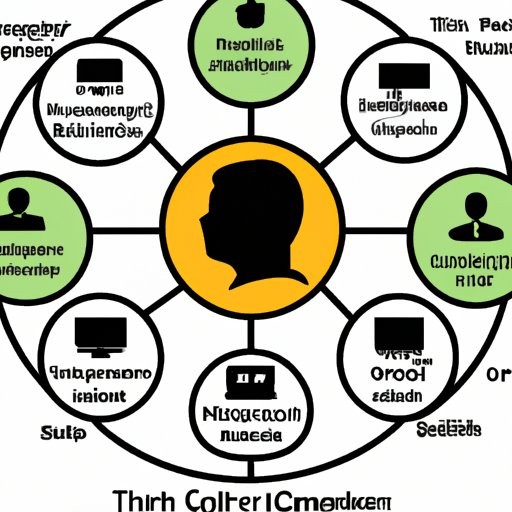Introduction
Information technology (IT) and computer science are two closely related fields that many people often confuse with each other. While they are both related to computers, they have distinct roles within the tech industry. In this article, we’ll explore the differences between IT and computer science and how these two disciplines can be used in different ways. We’ll also discuss the varied fields of IT and computer science, what you can do with a degree in each discipline, and the distinct roles of IT and computer science professionals.
Comparing IT and Computer Science: A Guide to the Differences
To understand the differences between IT and computer science, it’s important to first understand what each field entails. Let’s take a closer look at the two disciplines and how they overlap.
What is IT?
IT stands for information technology. It is a broad term that encompasses all aspects of managing, storing, sending, and receiving data. In short, IT is the use of technology to store, protect, and share data. IT professionals may work in a variety of industries, such as healthcare, finance, retail, or government. Their job may involve anything from setting up computer networks and troubleshooting hardware and software issues to providing customer service or training staff on new technologies.
What is Computer Science?
Computer science is the study of computers and their uses. It involves the design, development, and analysis of algorithms and software. Computer scientists may develop databases, write programs, or create applications for computers. They may also design computer systems and networks, as well as analyze and evaluate existing systems.
Areas of Overlap Between IT and Computer Science
It’s important to note that while there are distinct differences between IT and computer science, there are also areas of overlap. For example, both IT and computer science professionals may use programming languages to create software or websites. Additionally, both may need to understand the fundamentals of networking, such as IP addressing and DNS resolution. Finally, both disciplines require an understanding of data structures and algorithms.

Exploring the Varied Fields of IT and Computer Science
Now that we’ve looked at the core concepts of IT and computer science, let’s explore the different types of roles available in each field.
Types of IT Roles
IT professionals may specialize in a number of areas, such as network administration, system administration, database administration, or security. They may also focus on hardware or software support, or they may provide customer service and technical support. Additionally, some IT professionals may specialize in specific areas, such as web development, mobile application development, or cloud computing.
Types of Computer Science Roles
Computer science professionals may specialize in areas such as software engineering, artificial intelligence, machine learning, data science, and more. They may also focus on specific programming languages, such as Java or Python, or on specific platforms, such as Windows or Linux. Additionally, some computer science professionals may focus on developing video games or creating virtual reality applications.
What Can You Do With a Degree in IT Versus Computer Science?
When it comes to jobs, there are a number of options available for those with degrees in IT or computer science. Let’s take a look at the job opportunities in each field.
IT Degree Jobs
Those with degrees in IT may find jobs as network administrators, system administrators, database administrators, security specialists, software developers, or help desk technicians. Additionally, they may find jobs as project managers, business analysts, or IT consultants. Many IT professionals also find employment in the healthcare and financial sectors.
Computer Science Degree Jobs
Computer science graduates may find jobs as software engineers, web developers, game developers, or data scientists. They may also find positions as system architects, research scientists, or artificial intelligence experts. Additionally, some computer science professionals may find jobs as computer visionaries or robotics engineers.
How Are IT and Computer Science Different?
While there are some similarities between IT and computer science, there are also some key differences. Let’s take a look at how the two disciplines differ.
Differences in Technical Skills
One of the biggest differences between IT and computer science is the technical skills required for each field. IT professionals need to understand computer hardware and software, as well as networking and security. On the other hand, computer science professionals need to understand programming languages, algorithms, data structures, and software development. Additionally, computer science professionals must be able to think abstractly and solve complex problems.
Differences in Problem-Solving and Analytical Skills
Another difference between IT and computer science is the problem-solving and analytical skills required for each field. IT professionals must be able to identify and troubleshoot technical problems, as well as provide customer service. On the other hand, computer science professionals must be able to think critically and analyze data. They must also be able to design algorithms and develop software solutions.

A Look at the Distinct Roles of IT and Computer Science Professionals
Now that we’ve explored the differences between IT and computer science, let’s take a look at the responsibilities of each profession.
IT Professional Responsibilities
IT professionals are responsible for maintaining computer systems and networks. This includes installing, configuring, and troubleshooting hardware and software, as well as providing customer service and technical support. Additionally, IT professionals may be responsible for developing and implementing security policies, as well as designing and deploying networks.
Computer Science Professional Responsibilities
Computer science professionals are responsible for designing, developing, and testing software. This may include writing code, analyzing data, designing algorithms, and creating databases. Additionally, computer science professionals may be responsible for developing applications, optimizing systems, or researching new technologies.
Conclusion
In conclusion, IT and computer science are two closely related fields that often get confused. While they both involve computers, they have distinct roles within the tech industry. IT focuses on the use of technology to store, protect, and share data, while computer science focuses on the design, development, and analysis of algorithms and software. Additionally, IT and computer science professionals have different technical skills, problem-solving skills, and responsibilities. Those with degrees in either field can find a variety of jobs in various industries.
(Note: Is this article not meeting your expectations? Do you have knowledge or insights to share? Unlock new opportunities and expand your reach by joining our authors team. Click Registration to join us and share your expertise with our readers.)
